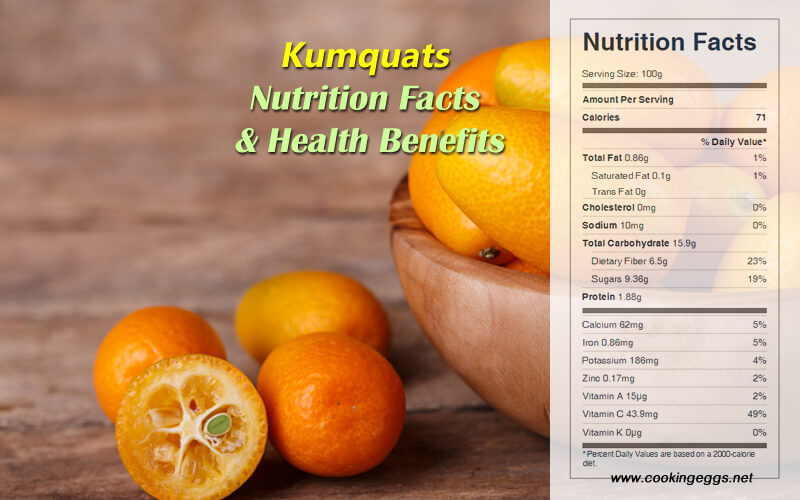Kumquats Nutrition Facts & Health Benefits
Kumquats are the smallest of the citrus fruits and are native to Southern China. Kumquats are pungent, sweet, and sour. The thin, sweet rind is jammed with powerful phytonutrients.
The nutritional value of kumquats
Raw kumquats are 80% water, 16% carbohydrates, 1% protein, and less than 1% fat. In a 100-gram reference serving, raw kumquats provide 71 kcal of food energy and are a rich source of vitamin C, while also providing folate, vitamin B6, riboflavin (B2), magnesium, manganese, and calcium in moderate amounts.

Raw Kumquats Nutrition Facts Label
Health Benefits of Kumquats
Kumquats are high in vitamin C, most of which is in the peel. This is a unique feature that differentiates them from other citrus family fruits. Vitamin C is a water-soluble vitamin that is required for the functioning of several enzymes and is important for immune system function.
Kumquats have good levels of the B complex vitamins such as thiamin, niacin, pyridoxine, folates, and pantothenic acid. These vitamins function as co-factors for the metabolism of carbohydrates, protein, and fats.
A carotenoid called beta-cryptoxanthin is one compound in kumquats that helps stimulate natural killer cells. Natural killer (NK) cells are an important part of the innate or nonspecific immune system, where they work to contain viral infections before the adaptive immune system kicks in. When you have a reduction in NK cells, diseases such as cancer can increase. Studies have shown that kumquats directly increase NK cells. A review of seven large trial studies found that people who consumed beta-cryptoxanthin had a 24% lower risk of lung cancer.
Two additional flavonoids found in kumquats are neoponcirin and poncirin. An animal study found that of normal-weight mice fed a high-fat diet for eight weeks, the mice who ate only the high-fat diet gained significantly more weight than the mice who ate the high-fat diet plus kumquat. This study's findings revealed a 12% increase in body weight in mice fed high-fat with kumquat, while mice fed low-fat with kumquat maintained their weight.The flavonoid poncirin plays a role in fat cell regulation.
In addition to stimulating natural killer cells in your immune system, compounds in kumquats affect fat cell size, having been shown to help maintain weight even when ingesting a high-fat diet.
Kumquats are also a good source of dietary fiber. By changing the nature of the contents of the gastrointestinal tract and by changing how other nutrients and chemicals are absorbed, dietary fibers may lower rates of coronary heart disease, colon cancer, and type 2 diabetes.